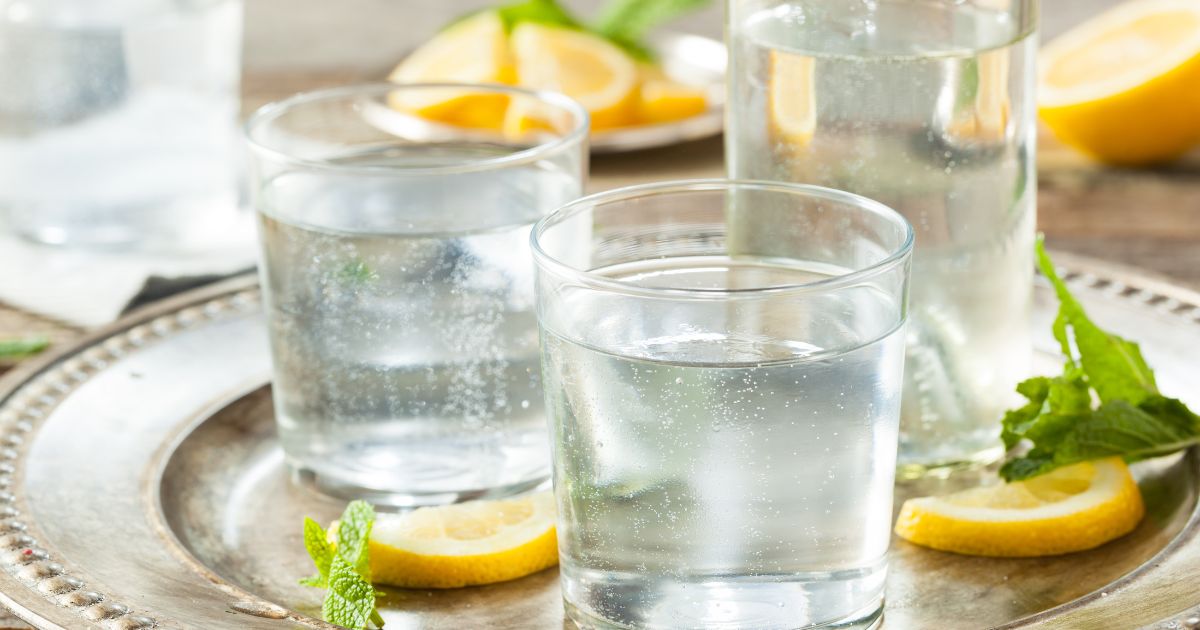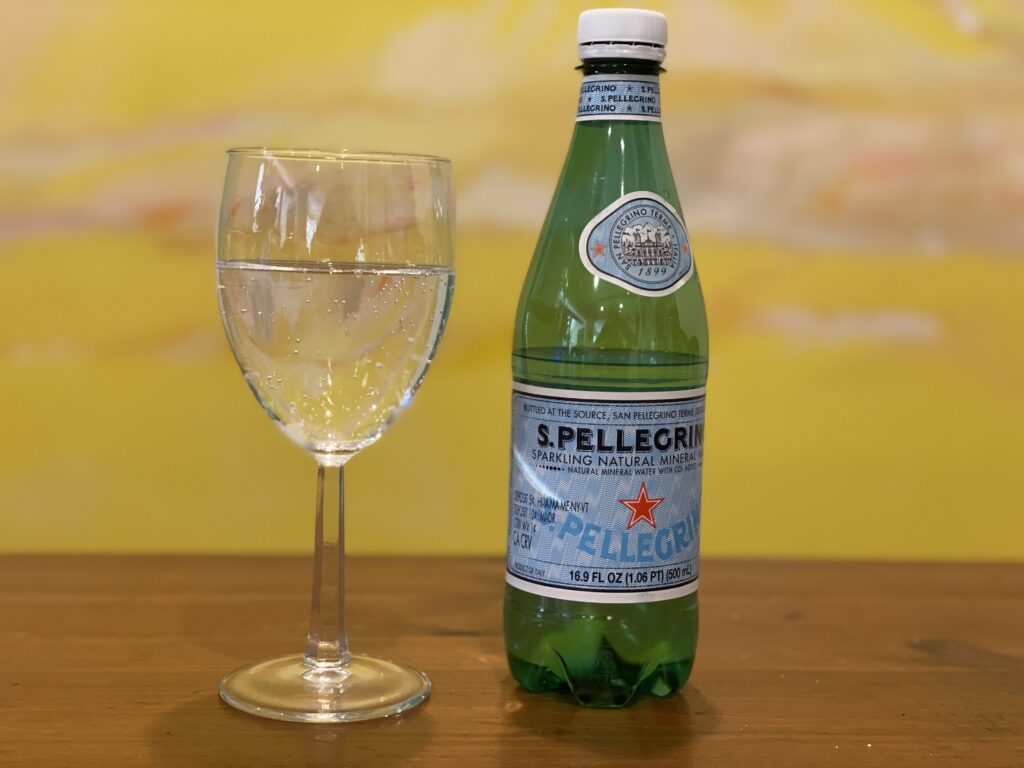Is Sparkling Water Good for You or Does It Fall Flat?

Maria H. Alaniz is the Director of Social Media for…
Aqua con gas. Carbonated water, also known as soda water, bubbly water, sparkling water, fizzy water, and club soda, has long been a household favorite. We would never dream of drinking soda or juice because the sugar content is through the roof. So, multiple generations in our family have gone all-in on sparkling water. We have tried them all and certainly consider ourselves expert consumers in the process.
Our Breathe Media team has been exploring various topics related to our water, from what causes water to taste different to understanding water stress and the natural cycle that our Earth’s water goes through. One key question we aim to answer is, “Is sparkling water good for you?” Below, we will delve into the nuances of sparkling water, examining its health benefits, potential concerns, and how it stacks up against traditional soda brands in the quest for healthier alternatives.
What is Sparkling Water?
Sparkling water, also known as carbonated water, is the fizzy delight that brings a little extra sparkle to our hydration game. Imagine plain water, but with the fun factor dialed up – that’s sparkling water for you. This bubbly beverage gets its effervescence from being infused with carbon dioxide gas (CO2) under pressure. But there’s more to it than just bubbles. Sparkling water often contains minerals like calcium, magnesium, and sodium, which not only enhance its flavor but can also offer some health perks.
Different Types of Carbonated Waters
- Sparkling Water (Sparkling Mineral Water):
- Picture this: water sourced from pristine springs or wells, naturally or artificially carbonated.
- It’s like a nature hike in a bottle, packed with natural minerals like magnesium, calcium, and sodium.
- Each sip is a refreshing burst of nature’s best.
- Club Soda:
- Think of club soda as the life of the party. It’s water with a bit of added flair.
- Infused with carbon dioxide and a mix of minerals like sodium bicarbonate, potassium sulfate, and sodium chloride.
- These added minerals give it a slightly salty taste, making it a cocktail’s best friend.
- Seltzer Water:
- Seltzer is the minimalist of the sparkling water world.
- Just plain water that’s been given a bubbly makeover with artificial carbonation.
- It’s straightforward, no-frills, and sometimes comes with natural flavors to keep things interesting.
- Tonic Water:
- Tonic water is the sophisticated, slightly bitter cousin in the sparkling water family.
- It’s carbonated water that contains quinine, giving it that signature bitter edge.
- Often sweetened with sugar or high-fructose corn syrup, it’s the perfect partner for gin in your favorite cocktail.
Each type of carbonated water brings its own personality and perks to the table, making sparkling water a versatile and enjoyable alternative to sugary sodas. Whether you’re mixing up a cocktail, adding a twist to your hydration routine, or just enjoying the fizz, there’s a sparkling water out there that’s just right for you. For a comparison between padel and pickleball, check out our detailed guide.
Health Benefits of Sparkling Water
Sparkling water isn’t just a fun, fizzy alternative to plain water – it comes with a host of health benefits that make it a great choice for staying hydrated and healthy. However, there has been some debate surrounding its benefits, from hydration effectiveness to concerns about acidity.
Hydration Benefits
One thing most experts agree on is that sparkling water is just as hydrating as still water. Despite the bubbles, you’re still drinking water, which is essential for keeping your body functioning properly. So if you find plain water a bit boring, sparkling water can be a great way to keep your hydration levels up without any extra calories or sugar. Explore fun and active ways to stay hydrated and fit in Miami, like ice skating at Breathe Miami. Explore fun and active ways to stay fit and hydrated in your area, such as indoor rock climbing. It’s a thrilling way to boost your fitness routine while enjoying the benefits of proper hydration. For those interested in a lively and social sport, padel has been gaining popularity across various regions. Check out the latest trends and hotspots in the Bay Area with our detailed guide on padel fever here.
Aiding Digestion
Sparkling water can also help with digestion. Many people find that the bubbles help to increase feelings of fullness, which can be particularly helpful if you’re trying to manage your weight. Additionally, the carbonation can provide relief from constipation by stimulating your digestive system and helping to get things moving. Some debate exists around this, as not everyone experiences these benefits equally, but for many, sparkling water is a digestive aid.
Bone Health
There has been concern about the potential negative impact of sparkling water’s acidity on bone health. However, this debate has been largely settled by studies showing that sparkling water is not harmful to bones. In fact, some types of sparkling water, particularly those sourced from natural springs, contain minerals like magnesium and calcium. These minerals are essential for maintaining strong bones and overall bone health, providing bone-boosting benefits rather than detracting from them.
In summary, sparkling water is a hydrating, digestion-friendly option that can also support your bone health, especially when it’s packed with natural minerals. Despite some debates, the evidence points to sparkling water being a beneficial addition to your hydration routine. So, go ahead and enjoy your fizzy drink, knowing it’s doing good things for your body!
Potential Concerns with Sparkling Water
While sparkling water has many benefits, there are some potential concerns to be aware of.
Tooth Enamel
One concern is the effect of sparkling water’s mild acidity on tooth enamel. Sparkling water typically has a pH of 3 to 4, which is mildly acidic. Repeated exposure to acidic liquids can potentially erode tooth enamel over time. However, the risk is relatively low compared to sugary sodas and other acidic drinks. Plain carbonated water poses a much lesser risk to dental health than sugar-sweetened carbonated beverages.
Bone Health
There has been some debate about whether the acidity of sparkling water might negatively impact bone health by affecting calcium absorption. However, studies have shown that only dark colas, which contain phosphoric acid, have a significant impact on bone health. Sparkling water, especially those with added minerals like magnesium and calcium, does not pose the same risk and may even offer some bone-boosting benefits.
Gas and Bloating
For some individuals, carbonated beverages can cause gas and bloating. If you have acid reflux or gastroesophageal reflux disease (GERD), you might experience increased gas, bloating, or heartburn from drinking sparkling water. In such cases, it might be better to stick with non-carbonated beverages like plain still water to avoid discomfort.
Sparkling Water vs. Still Water
When it comes to choosing between sparkling water and still water, there are a few key points to consider.
Hydration Benefits
Both sparkling water and still water are equally effective at keeping you hydrated. Despite the carbonation, sparkling water provides the same hydration benefits as still water, making it a suitable alternative if you prefer a bit of fizz.
Added Minerals and Flavors
One of the main differences between sparkling water and still water is the presence of added minerals and flavors in sparkling water. Sparkling mineral water contains natural minerals like calcium and magnesium, which can contribute to your overall mineral intake. However, not all sparkling waters are created equal, and some may contain added sugars, artificial sweeteners, or flavors.
Importance of Reading Labels
It’s essential to read the labels on sparkling water to ensure you’re getting a healthy product. Look out for added ingredients like caffeine, citric acid, and sweeteners, which can affect the nutritional value and health impact of the beverage. Opt for sparkling waters with low sodium content and no added sugars or artificial ingredients to make the healthiest choice.
In conclusion, both sparkling and still water offer excellent hydration benefits, but it’s important to choose your sparkling water wisely. By paying attention to the ingredients and opting for those with natural minerals and no added sugars, you can enjoy the fizz without compromising your health.
Top Sparkling Water Selections
When choosing a healthy sparkling water, there are a few key criteria to keep in mind:
- Low Sodium: Opt for brands that keep sodium levels to a minimum.
- No Added Sugars or Artificial Sweeteners: Look for products without added sugars or artificial sweeteners.
- Natural Flavors from Real Fruit Juice: Choose sparkling waters that derive their flavors from real fruit juice rather than synthetic additives.
Based on these criteria, here are some top sparkling water brands that stand out:
La Croix
La Croix is pronounced La-CROY, rhyming with ‘enjoy.’ All flavors of La Croix are gluten-free, vegetarian, and kosher, making it a versatile choice for various dietary preferences. La Croix is also considered “innocent” as it is free of sugars, calories, sodium, and artificial ingredients. Additionally, it is non-GMO, containing no genetically modified organisms. The natural grapefruit flavor in La Croix comes from pure grapefruit oil, with no added sugars or artificial ingredients; however, it is always best to consult a physician about any potential interactions with medications. Unlike seltzer water, which can contain sweeteners, added flavors, and varying amounts of sodium, La Croix Sparkling Water is sodium-free and contains only natural flavors. There are no sugars, sweeteners, or artificial ingredients in any La Croix waters. The water used in La Croix is locally sourced from various locations across the U.S. and is treated with strict filtration processes, including reverse osmosis and deionization, to ensure the highest quality and consistency by removing additives and impurities.
San Pellegrino

San Pellegrino offers a range of sparkling mineral waters sourced from natural springs. It contains natural minerals like calcium and magnesium, providing a refreshing and slightly mineral-rich taste.
Perrier
Perrier is another well-known brand that offers sparkling mineral water with natural carbonation. It comes in various flavors and is free from added sugars and artificial sweeteners.
Waterloo
Waterloo is celebrated for its bold, natural flavors and commitment to clean ingredients. It’s free from calories, sugars, and artificial sweeteners, making it a guilt-free choice.
Bubly
Bubly combines fun, vibrant packaging with a variety of natural flavors. It’s free from calories, sugars, and artificial sweeteners, and it’s also sodium-free.
Spindrift
Spindrift sets itself apart by using real squeezed fruit for flavoring, resulting in a delicious and natural taste. It contains a small amount of fruit juice, making it slightly more caloric but still a healthy choice.
Tips for Choosing Sparkling Water
Selecting the best sparkling water for your health involves more than just picking a brand. Here are some tips to help you make the best choice:
Reading Labels for Added Ingredients
Always check the label for any added ingredients. Avoid sparkling waters with added sugars, artificial sweeteners, or excessive sodium. Look for products that use natural flavors and have minimal additional components.
Avoiding High Citric Acid or Caffeine Content
Some sparkling waters contain high levels of citric acid or added caffeine. While a little citric acid is fine, high amounts can increase the risk of tooth enamel erosion. Similarly, if you’re sensitive to caffeine or trying to limit your intake, be sure to choose caffeine-free options.
Pairing Acidic Drinks with Meals and Regular Water
To mitigate the potential effects of acidity on your teeth, consider drinking sparkling water during meals and pairing it with regular still water. This can help neutralize the acid and protect your enamel.
By following these tips and choosing from the recommended brands, you can enjoy the refreshing fizz of sparkling water while maintaining a healthy diet and lifestyle.
Tips for Choosing Sparkling Water
When selecting the best sparkling water for your health, consider these tips:
Reading Labels for Added Ingredients
Always check the label for any added ingredients. Avoid sparkling waters with added sugars, artificial sweeteners, or excessive sodium. Look for products that use natural flavors and have minimal additional components.
Avoiding High Citric Acid or Caffeine Content
Some sparkling waters contain high levels of citric acid or added caffeine. While a little citric acid is fine, high amounts can increase the risk of tooth enamel erosion. Similarly, if you’re sensitive to caffeine or trying to limit your intake, be sure to choose caffeine-free options.
Pairing Acidic Drinks with Meals and Regular Water
To mitigate the potential effects of acidity on your teeth, consider drinking sparkling water during meals and pairing it with regular still water. This can help neutralize the acid and protect your enamel.
Conclusion
In summary, sparkling water offers numerous health benefits, such as effective hydration and support for digestion and bone health, with minimal risks when consumed appropriately. Despite some debates, the evidence supports sparkling water as a healthy addition to your diet. Enjoying sparkling water can be a delightful way to meet your hydration needs without the added sugars and calories found in sodas. As always, consult with your healthcare provider for personalized advice, especially if you have specific health conditions or dietary restrictions. So, go ahead and open a can or twist off a cap, and enjoy your fizzy drink with confidence!
Maria H. Alaniz is the Director of Social Media for Breathe Media, a Miami-based media company promoting wellness and mindfulness. With years of experience in managing influencers, project management, and social creative leadership, Maria brings a wealth of knowledge to the team. She is also a weekly contributor to Breathe Media domains, providing new insights and perspectives on wellness experiences. Maria is dedicated to inspiring people to live healthier, more fulfilling lives through her work with Breathe Media.

